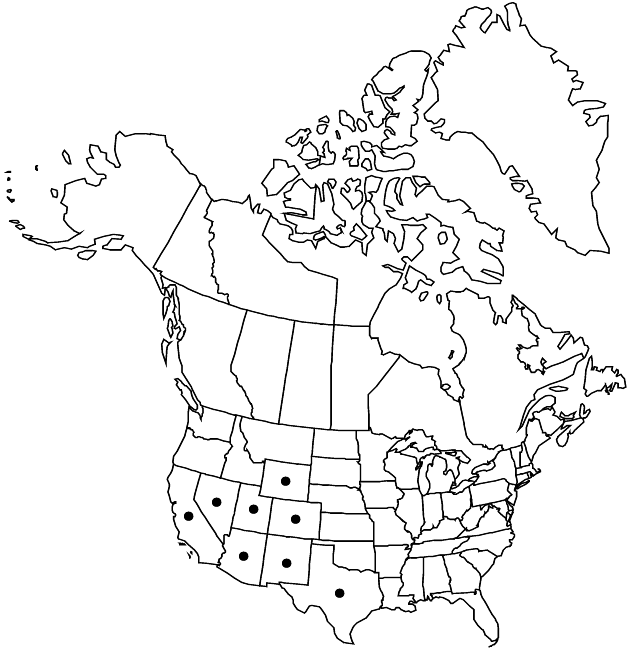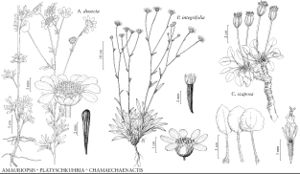Difference between revisions of "Amauriopsis dissecta"
in N. L. Britton et al., N. Amer. Fl. 34: 37. 1914.
FNA>Volume Importer |
FNA>Volume Importer |
||
| Line 29: | Line 29: | ||
|elevation=1600–2900 m | |elevation=1600–2900 m | ||
|distribution=Ariz.;Calif.;Colo.;Nev.;N.Mex.;Tex.;Utah;Wyo.;Mexico (Baja California;Chihuahua;Coahuila;Sonora). | |distribution=Ariz.;Calif.;Colo.;Nev.;N.Mex.;Tex.;Utah;Wyo.;Mexico (Baja California;Chihuahua;Coahuila;Sonora). | ||
| − | |discussion=<p>W. L. Ellison (1964) reported “n = 18, metaphase II,” based on observation of meiosis in a microsporocyte. D. J. Keil et al. (1988) noted that anthers are often abortive and meiosis is irregular and that seed set is usually high in A. dissecta. Keil et al. suggested that A. dissecta is an apomictic triploid derived from a cross between a diploid plant with n = x = 12 and a tetraploid plant (or unreduced gamete) with n = 2x = 24 so that for A. dissecta 2n = 3x = 36.</p><!-- | + | |discussion=<p>W. L. Ellison (1964) reported “n = 18, metaphase II,” based on observation of meiosis in a microsporocyte. D. J. Keil et al. (1988) noted that anthers are often abortive and meiosis is irregular and that seed set is usually high in <i>A. dissecta</i>. Keil et al. suggested that <i>A. dissecta</i> is an apomictic triploid derived from a cross between a diploid plant with n = x = 12 and a tetraploid plant (or unreduced gamete) with n = 2x = 24 so that for <i>A. dissecta</i> 2n = 3x = 36.</p><!-- |
| − | --><p>Some plants (from Arizona, Baja California, and New Mexico) with poorly developed ray corollas and ± hairy cypselae bearing pappi of 1–13 lance-linear to lance-subulate scales have been identified as belonging to Amauriopsis dissecta. Such plants may be hybrids resulting from crosses between A. dissecta and some other pappose species.</p> | + | --><p>Some plants (from Arizona, Baja California, and New Mexico) with poorly developed ray corollas and ± hairy cypselae bearing pappi of 1–13 lance-linear to lance-subulate scales have been identified as belonging to <i>Amauriopsis dissecta</i>. Such plants may be hybrids resulting from crosses between <i>A. dissecta</i> and some other pappose species.</p> |
|tables= | |tables= | ||
|references= | |references= | ||
| Line 54: | Line 54: | ||
|publication year=1914 | |publication year=1914 | ||
|special status= | |special status= | ||
| − | |source xml=https://jpend@bitbucket.org/aafc-mbb/fna-data-curation.git/src/ | + | |source xml=https://jpend@bitbucket.org/aafc-mbb/fna-data-curation.git/src/8f726806613d60c220dc4493de13607dd3150896/coarse_grained_fna_xml/V19-20-21/V21_990.xml |
|tribe=Asteraceae tribe Heliantheae | |tribe=Asteraceae tribe Heliantheae | ||
|subtribe=Asteraceae (tribe Heliantheae) subtribe Chaenactidinae | |subtribe=Asteraceae (tribe Heliantheae) subtribe Chaenactidinae | ||
Revision as of 16:38, 18 September 2019
Leaf lobes (3–)7–25(–75+), ovate to oblong or lanceolate to lance-linear, 4–12(–25+) × (1–)2–6(–12+) mm. Involucres 5–7+ × 10–18+ mm. Ray laminae 5–10+ mm. Disc corollas 2.5–3(–4+) mm, ± stipitate-glandular. Cypselae 2.5–4+ mm. 2n (= 3x) = 36.
Phenology: Flowering (Jun–)Aug–Sep(–Oct).
Habitat: Usually on sandy or gravelly soils, openings in pinyon-juniper, yellow pine, or spruce-fir forests
Elevation: 1600–2900 m
Distribution

Ariz., Calif., Colo., Nev., N.Mex., Tex., Utah, Wyo., Mexico (Baja California, Chihuahua, Coahuila, Sonora).
Discussion
W. L. Ellison (1964) reported “n = 18, metaphase II,” based on observation of meiosis in a microsporocyte. D. J. Keil et al. (1988) noted that anthers are often abortive and meiosis is irregular and that seed set is usually high in A. dissecta. Keil et al. suggested that A. dissecta is an apomictic triploid derived from a cross between a diploid plant with n = x = 12 and a tetraploid plant (or unreduced gamete) with n = 2x = 24 so that for A. dissecta 2n = 3x = 36.
Some plants (from Arizona, Baja California, and New Mexico) with poorly developed ray corollas and ± hairy cypselae bearing pappi of 1–13 lance-linear to lance-subulate scales have been identified as belonging to Amauriopsis dissecta. Such plants may be hybrids resulting from crosses between A. dissecta and some other pappose species.
Selected References
None.
